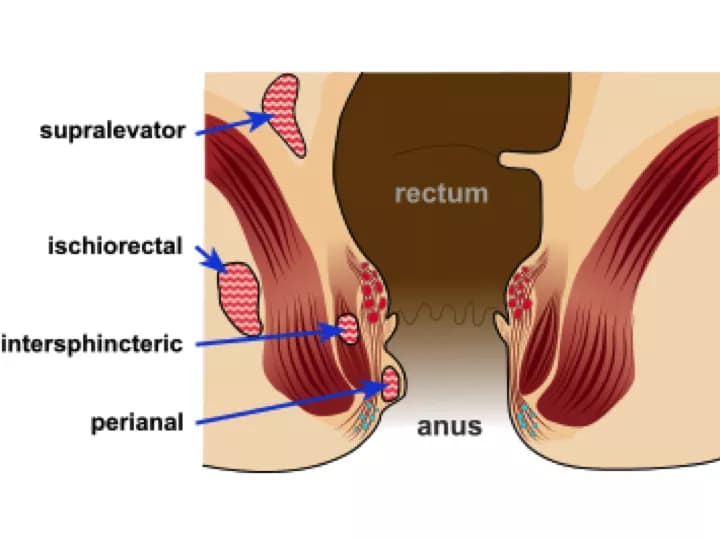
Anorectal Abscess
What are the other Names for this Condition? (Also known as/Synonyms)
- Anal Abscess
- Perirectal Abscess
- Rectal Abscess
What is Anorectal Abscess? (Definition/Background Information)
- Anorectal Abscess is a pus-filled cavity caused by bacterial infection of the mucus-producing glands in the anus and rectum
- The condition is characterized by swelling around the anus accompanied by a severe pain. Severe pain is also commonly seen during bowel movements
- Anorectal Abscess commonly affects individuals in the age group of 30-40 years. Those with diabetes, Crohn's disease, on long-term steroids, and AIDS patients are at an increased risk of Anorectal Abscess
- The condition is usually diagnosed through a physical and rectal exam
- A surgical drainage of the abscess is the treatment of choice. Prompt diagnosis and appropriate immediate treatment usually results in a good prognosis
Who gets Anorectal Abscess? (Age and Sex Distribution)
- Anorectal Abscess is typically observed in young adults in the 30-40 years’ age group
- Men are at higher risk than women for this condition
- In rare cases, infants who are still in the ‘diaper stage’ may also be affected
- There is no racial, ethnic, or regional predominance observed
What are the Risk Factors for Anorectal Abscess? (Predisposing Factors)
The risk factors for Anorectal Abscess may include:
- Poorly-controlled type 1 and type 2 diabetes: Any individual with a very high level of blood sugar is at a high risk for Anorectal Abscess
- Inflammatory bowel diseases, such as Crohn’s disease and ulcerative colitis, tend to affect the gastrointestinal tract and are likely to increase one’s risk
- Chronic steroid treatment: Any individual undergoing long-term steroid treatment will be more susceptible to the condition
- Anal sex: The receptive partner of anal sex faces a high risk of Anorectal Abscess
- Medications used in the treatment of cancer, such as chemotherapy drugs, tend to increase the risk for Anorectal Abscess
- Immunocompromised individuals such as individuals with HIV infection and AIDS
- Family history of Anorectal Abscesses
It is important to note that having a risk factor does not mean that one will get the condition. A risk factor increases ones chances of getting a condition compared to an individual without the risk factors. Some risk factors are more important than others.
Also, not having a risk factor does not mean that an individual will not get the condition. It is always important to discuss the effect of risk factors with your healthcare provider.
What are the Causes of Anorectal Abscess? (Etiology)
- Anorectal Abscess is a pus-filled cavity usually caused by a bacterial infection of the mucus-producing glands in the anus and rectum. It may also be described as an infection of the soft tissues present in and around the anal canal
- The common causes for the occurrence of Anorectal Abscess include:
- Glands which have been blocked in the anal area
- Anal fissures: A tear in the lining of the lower rectum that causes severe pain during bowel movements
- Anal fistula: An abnormal tract between the anal canal and surrounding skin causing recurrent abscess
- Sexually transmitted diseases may lead to Anorectal Abscess
- Deep rectal abscess may be caused by inflammatory bowel infections such as:
- Crohn’s disease: Inflammatory bowel diseases that affect the gastrointestinal tract is likely to increase the risk
- Diverticulitis: A common digestive disease wherein pouch-like structures are formed within the walls of the bowel
What are the Signs and Symptoms of Anorectal Abscess?
The common signs and symptoms of Anorectal Abscess include:
- Swelling around the anus
- Constant pain in the anal area; severe pain during bowel movements
- Constipation
- Pus discharge from the rectum
- Fatigue or loss of energy
- Malaise
- Fever and chills
- Night sweats
- Tenderness and redness around the anal area
- Feeling of discomfort
- Pain in the lower abdomen
- Irritation of the skin around the anus
How is Anorectal Abscess Diagnosed?
The diagnosis of Anorectal Abscess may involve:
- A thorough evaluation of medical history and physical examination shall be undertaken by the physician
- The physical examination shall include a rectal examination
- Proctosigmoidoscopy: It is a procedure used to perform internal examination of the anus, rectum, and colon to eliminate other diseases
- In very rare cases, when Anorectal Abscesses are very deep, a CT scan of the pelvis, MRI scan of the abdomen, and rectal ultrasound may be needed to determine the exact location where the pus has got accumulated
- Blood tests may reveal an increase in white blood count, which is a proof of infection in the body
- Differential diagnosis - screening tests may be performed to exclude the following conditions:
- Sexually transmitted diseases
- Inflammatory bowel diseases
- Diverticular diseases
- Lower gastrointestinal tract infections
Many clinical conditions may have similar signs and symptoms. Your healthcare provider may perform additional tests to rule out other clinical conditions to arrive at a definitive diagnosis.
What are the possible Complications of Anorectal Abscess?
Anorectal Abscess could lead to the following complications namely:
- Anal fistula: It is a tract that develops between the bowel and the skin near the anus, which causes bleeding, pain, and discharge during bowel movements
- Spread of infection throughout the body when the infection enters the bloodstream (septicemia)
- Pain, which is continuous and severe
- Recurrence of the abscess
- Scarring in the anal region
How is Anorectal Abscess Treated?
The treatment of Anorectal Abscess may involve:
- Surgical procedure is performed to cut open the abscess and drain the pus. The drainage of abscess procedure will involve:
- Administration of spinal anesthesia
- A stay in the hospital will be required, if the abscess is very deep
- Otherwise, it is mostly an outpatient procedure
Sitz baths (sitting in a tub of warm water) will soothe the pain, reduce swelling, and can help in healing the abscess
- After surgery, the physician may prescribe pain-relievers and antibiotics
How can Anorectal Abscess be Prevented?
- Immediate medical treatment of sexually transmitted diseases (STDs) will help prevent the development of Anorectal Abscess
- Use of condoms during vaginal intercourse and anal sex is one of the preventive measure to be adopted
- Preventive measures to be adopted in infants and toddlers may include:
- Changing the diaper at frequent intervals
- Maintaining proper hygiene during diaper changes can also help in prevention
What is the Prognosis of Anorectal Abscess? (Outcomes/Resolutions)
- Proper diagnosis and immediate treatment of Anorectal Abscess is necessary to ensure a good prognosis
- A delay in treatment may lead to complications
- Generally, infants and toddlers recover quickly from the condition
Additional and Relevant Useful Information for Anorectal Abscess:
The following DoveMed website link is a useful resource for additional information:
Related Articles
Test Your Knowledge
Asked by users
Related Centers
Related Specialties
Related Physicians
Related Procedures
Related Resources
Join DoveHubs
and connect with fellow professionals


0 Comments
Please log in to post a comment.